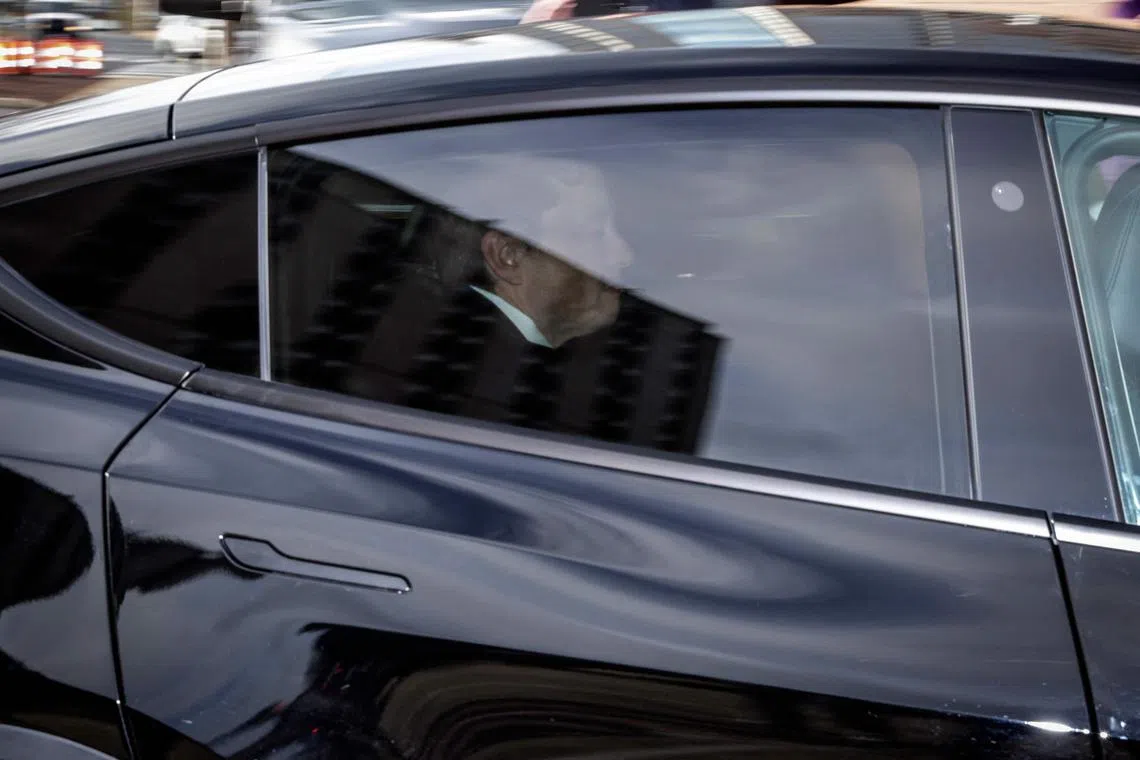Musk testifies at trial over his $77 billion Tesla compensation
Sign up now: Get ST's newsletters delivered to your inbox

Tesla CEO Elon Musk arrives to testify at the Leonard L. Williams Justice Center in Wilmington on Nov 16, 2022.
PHOTO: AFP
WILMINGTON, United States - Mr Elon Musk, known for his combative testimony, took the stand in a Delaware court on Wednesday to defend against claims that his US$56 billion (S$77 billion) Tesla pay package
Mr Musk began by answering questions from his attorney about his history at Tesla and described how the company was struggling to survive in 2017, when the pay package was developed.
“I thought it was extremely unlikely,” he said in response to a question of whether he thought at the time if Tesla would succeed.
Tesla shareholder Richard Tornetta sued Mr Musk and the board in 2018 and hopes to prove that Mr Musk used his dominance over the electric vehicle maker’s board to dictate terms of the package, which did not require him to work at Tesla full-time.
Mr Musk’s testimony before Chancellor Kathaleen McCormick comes as he is struggling to oversee a chaotic overhaul of Twitter, the social media platform he was forced to buy for US$44 billion in a separate legal battle before the same judge after trying to back out of that deal.
Investors are growing concerned about Mr Musk’s focus on Twitter, and on the stand the billionaire said he focuses his attention where it is needed most, which in 2017 was Tesla.
“So in times of crisis, allocation changes to where the crisis is,” said Mr Musk, who wore a dark suit and tie.
Mr Musk, the world’s richest person, tweeted this week that he was remaining at Twitter’s San Francisco headquarters around the clock until he fixed the company’s problems.
Mr Tornetta has asked the court to rescind the 2018 package, which Mr Tornetta’s attorney Greg Varallo said was US$20 billion larger than the annual gross domestic product of the state of Delaware.
The legal team for Mr Musk and the Tesla directors, who are also defendants, have cast the pay package as a set of audacious goals that worked by driving 10-fold growth in Tesla’s stock value, to more than US$600 billion from around US$50 billion.
They have argued the plan was developed by independent board members, advised by outside professionals and with input from large shareholders.
On Monday and Tuesday, the court got a taste of Mr Musk’s testimony through short clips from his 2021 deposition in the litigation. In one clip, Mr Musk dismissed the idea that the board should have discussed requiring that he spend more time with Tesla.
“That would have been silly,” said Mr Musk, who is also the chief executive of rocket company SpaceX and founded tunnelling venture The Boring Co.
Mr Musk has a history of combative testimony and often appears disdainful of lawyers who ask probing questions. He has called opposing attorneys “reprehensible”, questioned their happiness and accused them of “extortion”.
In 2021, Mr Musk told a lawyer for a shareholder suing him over the 2016 acquisition of SolarCity that he was “a bad human being”.
Mr Musk can also show his charm in court. He apologised from the stand to a British diver whom he called “pedo guy” in a tweet and who sued Mr Musk for defamation. The jury in the case found Mr Musk did not defame the diver.
The disputed Tesla package allows Mr Musk to buy 1 per cent of Tesla’s stock at a deep discount each time escalating performance and financial targets are met. Otherwise, Mr Musk gets nothing.
Tesla has hit 11 of the 12 targets, according to court papers.
Shareholders generally cannot challenge executive compensation because courts typically defer to the judgment of directors. The Musk case survived a motion to dismiss because it was determined he might be considered a controlling shareholder, which means stricter rules apply.
“There is no case in which a 21.9 per cent shareholder who is also the chief executive has received a structured payout plan of this magnitude,” Dr Lawrence Cunningham, a corporate law professor at George Washington University, said of the lack of precedent.
Mr Musk cancelled an in-person appearance on Sunday at an event on the sidelines of the G-20 in Bali to be in court.
Asked why he had not travelled to the tropical Indonesian island, the new Twitter boss joked that his “workload has recently increased quite a lot” after his takeover of the social media giant.


